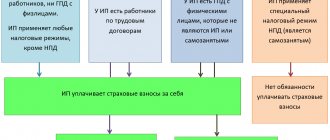On November 30, 2021, changes were made to the Tax Code that allow taxes to be paid for a third party. Before the introduction of innovations, a merchant could only fulfill the obligation to pay taxes independently; the legislation did not allow paying the fiscal obligations of other companies.
The change is perfect for groups of companies or, in other words, holdings, in which one enterprise can pay taxes for other group members without unnecessary transfers of funds between organizations, also reducing the tax risks of companies that are part of a business association. Payment of taxes for a third party may be required if there is an urgent need to pay off tax debts, but there are no funds in the current account of the organization itself, while the founder is ready to pay the debt of his company.
Thus, third party tax payments are a useful mechanism for taxpayers to save time in emergency situations.
Long-awaited changes
Previously, tax legislation obligated taxpayers to pay taxes and fees independently (clause 1 of Article 45 of the Tax Code of the Russian Federation). However, due to the entry into force of Federal Law No. 401-FZ of November 30, 2016, the situation has changed. This law amended Article 45 of the Tax Code of the Russian Federation, thanks to which third parties will be able to pay taxes, fees and insurance premiums for organizations, individual entrepreneurs or individuals. However, the amendments will be introduced in stages, namely:
- from November 30, 2021, some persons have the right to pay taxes and fees for others;
- from January 1, 2021, third parties have the right to transfer insurance premiums for others.
Payment of taxes and fees by third parties from November 30, 2021
Federal Law No. 401-FZ dated November 30, 2016 was officially published on the legal information portal on December 30, 2021. From this date, third parties were able to pay taxes and fees for others. This is provided for in paragraph 1 of Article 13 of this law.
From the provisions of the new edition of Article 45 of the Tax Code of the Russian Federation it follows that from December 30, 2021, third parties can pay any taxes and fees for others. From the specified date for an organization, individual entrepreneur or individual, you can transfer:
| Value added tax (VAT) |
| Excise taxes |
| Personal income tax (NDFL) |
| Income tax |
| Mineral extraction tax |
| Water tax |
| State duty |
| Unified Agricultural Tax (USAT) |
| Single tax under “simplified taxation” (USN) |
| "Patent" tax (PSN) |
| Unified tax on imputed tax (UTII) |
| Organizational property tax |
| Gambling tax |
| Transport tax |
| Land tax |
| Property tax for individuals |
| Trade fee |
It is worth noting that the Tax Code does not contain any restrictions regarding the circle of persons who have the right to pay taxes and fees for taxpayers. Thus, various options are possible:
- an organization can pay taxes and fees for another organization, individual entrepreneur or individual;
- an individual entrepreneur can transfer taxes and fees for another individual entrepreneur, organization or individual;
- an individual has the right to pay taxes and fees for another individual, organization or individual entrepreneur.
Thanks to these amendments, for example, the founder or director of a company, starting from November 30, 2021, can easily pay taxes and organization fees from his own funds. This may be necessary if, for example, there is not enough money in the account of a legal entity to pay. Previously, third parties did not have the right to fulfill the obligation to pay taxes and fees for the organization (Letter of the Ministry of Finance of Russia dated February 14, 2013 No. 03-02-08/6).
One pressing problem was also resolved. Some may have encountered a situation where one individual asks another to pay the tax for them, which is specified in the tax payment notice.
Example. November 8, 2021, citizen Ivanova I.A. I received a notification by mail from the Federal Tax Service about the payment of property tax for my apartment. She gave the notice to her son and asked him to pay the tax for her so that she would not have to go to the bank. Until November 30, 2016, her son was not entitled to pay tax for his mother from his own funds. If he had done this and he was listed as a payer in the payment order, then the tax authorities could not recognize the obligation to pay the tax as fulfilled. And the payment would be sent to “unexplained payments.” In turn, Ivanova I.A. an arrears would arise and penalties would be charged. However, from November 30, 2021, there will be no such problem. The son can remit the tax for his mother and not be afraid that the tax will not be considered paid.
Therefore, from November 30, 2021, you can pay taxes and fees for another person, for example, through Sberbank online or from your bank card. There shouldn't be any more problems with this. Also, taxes of an individual from the specified date can be paid from the current account of the individual entrepreneur.
State duty is a fee (333.16 Tax Code of the Russian Federation). Consequently, from November 30, 2021, third parties can pay not only taxes, but also state fees for organizations, individual entrepreneurs and individuals.
What makes it possible for representatives to pay taxes?
Amendments to the Tax Code of the Russian Federation are beneficial to both the state and the taxpayer. Let's look at the main benefits:
- Prevention of violation of budget replenishment deadlines. Sometimes a company cannot fulfill its obligations on time. Subject to the amendments, she has the right to transfer the obligation to pay to other persons. Therefore, no debt is generated. The country's budget is replenished in a timely manner.
- The taxpayer does not incur any debt. Consequently, fines and penalties also do not appear.
- A third party no longer needs to collect a package of documents that confirm that the funds paid belong to the taxpayer.
The innovation is designed to improve the tax payment system. It also reduces the amount of debt. However, the amendment has some disadvantages. In particular, banks accepting funds face increased payment processing burden.
Payment of insurance premiums by third parties from January 1, 2021
Organizations and individual entrepreneurs are required to transfer payments for insurance premiums independently (Part 4, Article 15, Part 2, Article 16 of the Federal Law of September 24, 2009 No. 212-FZ “On Insurance Premiums”). However, this federal law will no longer apply as of January 1, 2021. This is due to the fact that insurance premiums (except for contributions for injuries) are transferred from the Pension Fund to the control of the Federal Tax Service. From January 1, 2017, insurance premiums will be regulated by the provisions of the Tax Code of the Russian Federation. See "Insurance premiums from 2021: overview of changes." https://buhguru.com/strahovie-vznosy/strakh-vznosy-2017.html
From January 1, 2021, the provisions of the tax legislation of the Russian Federation will allow third parties to pay insurance premiums for others (except for contributions “for injuries”) - new paragraph 9 of Article 45 of the Tax Code of the Russian Federation. That is, you can transfer contributions from the moment their administration passes to the tax authorities. From 2021, third parties will be able to transfer the following types of insurance premiums:
| Insurance contributions for compulsory pension insurance |
| Insurance premiums for compulsory health insurance |
| Insurance premiums in case of temporary disability and in connection with maternity |
Thus, from January 1, 2021, third parties will be able to pay insurance premiums, like taxes and fees, for any organization or individual entrepreneur. So, for example, an individual will be able to pay contributions for any individual entrepreneur.
However, keep in mind that insurance premiums for injuries in 2017 will remain under the control of the Social Insurance Fund and will continue to be regulated by Federal Law No. 125-FZ of July 24, 1998 “On compulsory social insurance against industrial accidents and occupational diseases” " At the same time, based on paragraph 1.1 of Article 22 of this law, policyholders, as before, will have to pay insurance premiums on their own. That is, third parties will not be able to transfer contributions “for injuries”.
Third parties have the right to pay taxes, fees and insurance premiums for others solely on a voluntary basis.
Transfer of money to a creditor at the request of a supplier: example of postings from the payer and debtor
How should transactions reflect payment for a third party? Repayment of a debt for a third party affects the accounting of the payer, debtor and creditor in most cases:
- settlement accounts (60,62, 76, etc.)
- expense accounts (44, 26, 91, etc.);
- payment accounts (50, 51, 55).
Let's look at the transactions when paying to a third party at the request of the supplier using an example.
Panther LLC sold a batch of goods worth 350,000 rubles. (cost of goods - 286,000 rubles) to PJSC Jaguar. At the same time, Panther LLC owed IP Zavgorodniy P.N. the same amount for renting production premises. Panther LLC appealed to the management of Jaguar PJSC with a request to transfer the debt for the supplied goods directly to the bank account of its lessor to pay off the rent arrears.
How Panther LLC will reflect this operation in its accounting is shown in the figure below (to simplify the example, we assume that VAT is not involved in the calculations):
Such postings are used when paying for a supplier to a third party in the accounting of the supplier himself. What transactions are required to be made by the payer when paying for a third party, see below:
In creditor accounting, the entries will be even simpler. Based on the debtor's notification and a bank statement about the amount received from a third party, he will cover the debtor's debt. No additional wiring is required.
Find out below what documentary support for such operations will be required.
Find out what transactions are reflected in transactions under a receivables transfer agreement (assignment) in this article.
How to transfer payments to third parties
If someone wants to pay taxes, fees or insurance premiums for others, then most likely the question will arise about how to fill out payment orders for such payment. Let me explain.
The tax, fee or insurance premiums will be considered paid on the day when the third party presents to the bank a payment order to transfer money from his current account to the account of the Treasury of Russia. In this case, there must be enough money in the current account for such a payment.
Of course, the payment order must be filled out correctly. Third parties must fill it out in accordance with the Rules approved by Order of the Ministry of Finance of Russia dated November 12, 2013 No. 107n. This follows from the first paragraph of paragraph 7 of Article 45 of the Tax Code of the Russian Federation. In our opinion, in the payment order the third party must indicate information about himself as the payer. Information about the payer is indicated in fields 8 “Payer”, 60 “TIN” and 102 “KPP”. However, in the purpose of the payment you will need to indicate which organization, individual entrepreneur or individual the payment is being made to. Here is a sample filling.
However, it is worth noting that, perhaps, the payment rules will be adjusted in 2017 and will provide for a special procedure for filling out payment orders by third parties. It is also possible that additional clarification will appear on the procedure for filling out payment orders when making payments to third parties.
How does legislation affect the nuances of accounting for payments to a third party?
The order of accounting entries made when paying for third parties may be influenced by legal regulations.
The law does not prohibit a company or individual entrepreneur from paying off the obligations of third parties. The subtleties of this procedure are described in Art. 313 Civil Code of the Russian Federation. But there is a limitation for such an operation - the presence in the law or agreement between the parties of a clause on the mandatory fulfillment of obligations personally by the participants in the transaction. If such a condition exists, additional entries in the accounting of counterparties will not be needed - all transfers under the agreement will occur without the participation of third parties.
Although no one prohibits a third party from financially supporting the debtor. This person can transfer money to pay off the debt, for example, as part of a loan agreement. In this case, settlements between the debtor and the third party will be made within the framework of the loan agreement using the accounting entries inherent in this type of agreement.
Find out what transactions are used when recording loans in accounting from this material.
We will describe below what transactions are made when paying for a third party.
What are the restrictions?
It is worth noting that there are some restrictions associated with the transfer of taxes, fees and insurance premiums. They are as follows:
- after payment, a third party does not have the right to demand the return of the amount paid to an organization, individual entrepreneur or individual;
- It will be impossible to clarify the payment of insurance premiums for compulsory pension insurance if the Pension Fund of Russia division manages to record the received amounts in the personal accounts of the insured persons.
Third parties are not required to obtain any authorization to pay taxes, fees or insurance premiums for others.
Free transfer
Let us note that the financial department has expressed such an opinion more than once. Earlier, the Ministry of Finance voiced a similar position, but on a different issue. In letter dated June 28, 2021 No. 03-03-06/1/40668, financiers consider the situation when taxes are paid for a third party free of charge in the absence of counter-debt to the counterparty. In practice, it is not recommended to pay taxes for another person, registering it as a gratuitous transfer, because in addition to the fact that the amounts of taxes paid cannot be included in expenses, the third party will have non-operating income, on which it is also necessary to pay tax.
Thus, paying taxes free of charge for a third party is not the best option both for a company that is ready to help a business partner, and for an enterprise for which another legal entity is ready to pay off tax obligations.
Tax accounting of third party payments
Let's say a few words about tax accounting of payments received from third parties.
Personal income tax
If, for example, someone pays a tax or fee for an individual, then such a payment will not be considered income of the individual (clause 5 of Article 208 of the Tax Code of the Russian Federation). Accordingly, there will be no need to pay personal income tax on such an amount.
simplified tax system
It is possible that in 2021 a third-party organization, individual entrepreneur or individual will pay his taxes, fees or insurance premiums for the “simplified person”. Will it be possible to take such payments into account when calculating the “simplified” tax? No, starting from 2021, payments from third parties for taxes, fees and contributions cannot be simply attributed to expenses. However, in subparagraph 3 of paragraph 2 of Article 346.17 of the Tax Code of the Russian Federation, legislators provided that expenses can be recognized after repayment of the resulting debt to a third party. Let us explain the procedure for recognizing such expenses in the table.
| Type of consumption | Procedure for recognizing expenses |
| Payments by a third party in favor of the simplified person for taxes, fees and insurance premiums. | They are taken into account in the amount actually paid when the “simplified” person repays the debt to a third party that arose in connection with his payment of taxes, fees or insurance premiums. |
| Payments by a third party in favor of the simplified person to repay debts on taxes, fees and insurance premiums. | They are taken into account within the limits of the actually repaid debt in those reporting (tax) periods when the “simplified” repaid the debt to a third party, which arose in connection with the payment of arrears on taxes, fees and contributions. |
Thus, in order for a taxpayer with the object of taxation “income minus expenses” to be able to take into account payments from third parties in expenses from 2021, it will be necessary to return to these persons the amounts they spent on paying taxes, fees and insurance premiums (or debts on them). This is provided for by Federal Law No. 401-FZ of November 30, 2016.
Unified agricultural tax
If taxes or insurance premiums are transferred for the payer of the single agricultural tax, then you should be guided by the updated paragraph 2 of Article 346.5 of the Tax Code of the Russian Federation: first, a third party transfers money to the budget, and then the payer of the Unified Agricultural Tax payer reimburses this person for the amount spent. Under such circumstances, taxes and contributions cannot be taken into account in the expenses of the Unified Agricultural Tax payer, but the amount of compensation can be taken into account. The exception is the agricultural tax itself, as well as the VAT that was paid in connection with the issuance of an invoice. Reimbursement of the amount spent on paying these taxes is not included in the costs. These rules are in effect from January 1, 2021.
From November 30, third parties have the right to pay taxes and fees for others and for earlier periods. So, for example, you can pay off arrears incurred in 2014 or 2015. The situation is similar with insurance premiums.
Read also
18.07.2018
Who exactly can pay tax?
The obligation involves paying the tax on time. If the funds are paid, but the terms are violated, the obligation will not be considered fully fulfilled. The obligation ends when the money is sent to the required address. Who can be the third party who pays funds for the taxpayer? These are the following persons:
- Legal representative. It will act on the basis of the constituent documentation.
- Authorised representative. He will carry out transactions on the basis of a power of attorney. It is valid for 3 years.
Paragraph 2 of Article 37 of the Tax Code of the Russian Federation states that tax can be paid by third parties working on their own behalf. However, these persons must have appropriate authority, confirmed by documents. Otherwise, the funds sent will be considered an overpayment by the illegal representative, and the company’s obligation will never be repaid.
IMPORTANT! The funds may be paid by the tax agent. If payment deadlines are postponed, a surety agreement must be drawn up. If the representative does not transfer the money, it is collected from the guarantor.









